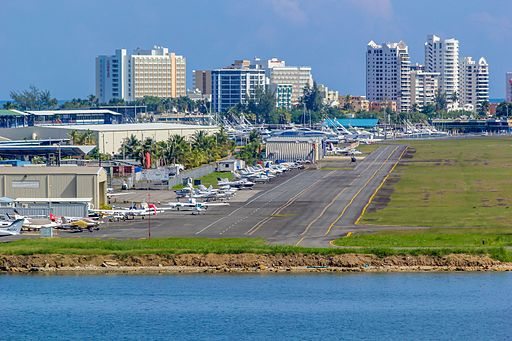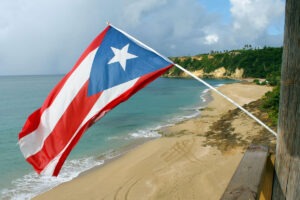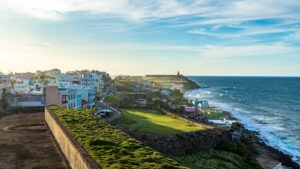
May 7, 2017; Washington Post
After 11 years of almost constant recession, on May 3rd, Puerto Rico declared a form of bankruptcy for $123 billion, the biggest U.S. government bankruptcy to date. This recent development apparently began in March when Governor Ricardo Rosselló (son of former governor Pedro Rosselló) issued a five-year fiscal plan with only $800 million a year allocated to service the debt, rather than the $3.5 billion a year it actually costs.
Puerto Rico’s creditors have protested the budget allocation but had to wait until May 1st for the expiration of a court stay that had prevented them from suing. By May 3rd, two days later, there were 22 creditor lawsuits. Governor Rosselló’s bankruptcy-like filing that very same day stopped the lawsuits from proceeding.
Many of the creditors “are hedge funds that purchased Puerto Rican debt at a discount, after the debt crisis began, angling for a windfall.” The biggest debt, at $12 billion, is owed to Puerto Rico’s own Banco Popular, which issued the bonds that have been funding the island’s day-to-day operations.
Puerto Rico has a population of about 3.5 million and an unemployment rate of 12 percent, more than double that of the U.S. Since 2007, it has lost 20 percent of its jobs and 10 percent of its population. According to USA Today, “Six in 10 Puerto Ricans are unemployed or not interested in working and nearly half are enrolled in Medicaid,” which provides health insurance for the poor.
Puerto Rico is increasingly unable to provide basic services: “The three main retirement systems in Puerto Rico are expected to ‘deplete’ all their assets between July and December.” And, “because Puerto Ricans are American citizens, the island’s taxpayers can escape austerity by fleeing to the mainland, leaving fewer people to pay to the debt.” It is a vicious cycle.
Government workers will forgo pension money, public health and infrastructure projects will go wanting, and the “brain drain” the island has been suffering as professionals move to the mainland could intensify…The governor’s fiscal plan also calls for shifting all current government workers from pensions into 401(k)-style retirement plans. Current retirees will continue to receive their traditional monthly pensions, but the amounts are to be reduced by about 10 percent on average.
The upcoming court proceeding for Puerto Rico will not formally be called a bankruptcy. Instead, it is seeking relief under Title III of the PROMESA (Puerto Rico Oversight, Management and Economic Stability Act) law signed by Obama to prevent a humanitarian crisis.
Just days after the bankruptcy-like filing, Puerto Rico announced that it is closing 170 public schools in an effort to save $7 million. Over 27,000 students will be moved to other schools. Officials have already closed 150 schools between 2010 and 2015. Aida Diaz, president of Puerto Rico’s Association of Teachers, said, “Many of the schools closing have few students and crumbling infrastructure.”
Puerto Rico currently has a total of 1,292 public schools that serve 365,000 students. The island has seen its school enrollment drop 42 percent in the past three decades, and an additional 22 percent drop is expected in upcoming years, according to a report that the Boston Consulting Group submitted to the previous administration to help restructure Puerto Rico’s education system.
Sign up for our free newsletters
Subscribe to NPQ's newsletters to have our top stories delivered directly to your inbox.
By signing up, you agree to our privacy policy and terms of use, and to receive messages from NPQ and our partners.
Much of the drop was the result of parents moving to the mainland U.S. in search of jobs and a more affordable life, as well as thousands of teachers being recruited from the island for their bilingual skills.
Furthermore…
While many of Puerto Rico’s circumstances are unique, its case is also a warning sign for many American states and municipalities—such as Illinois and Philadelphia—that are facing some of the same strains, including rising pension costs, crumbling infrastructure, departing taxpayers and credit downgrades that make it more expensive to raise money.
The largest U.S. municipal bankruptcy was filed by Detroit in 2013 for $18 billion. Governing, which has been tracking municipal bankruptcies in the U.S., found that bankrupt municipalities are still rare, at less than one percent.
Still, this “predicament may turn out to be a cautionary tale for bond holders of other troubled states and cities. Puerto Rico’s case could show public workers and retirees that seemingly inviolate pension systems can be changed, too.”
The Puerto Rican government’s fiscal plan seeks to balance the budget over the next three years with austerity cuts worth 10 percent of the GNP by 2020. As can be expected, many Puerto Ricans are not happy about this. “Striking anti-austerity protesters [filled] the streets on May 1st, disrupting public transport and forcing many firms to close for the day.”
Last Friday, “U.S. District Judge Laura Taylor Swain from Southern District of New York was designated as the presiding judge in Puerto Rico’s bankruptcy-like case.” The oversight board will negotiate debt cuts with creditors and propose a plan of adjustment. The judge will decide whether to authorize the plan.
In the midst of this economic crisis, Puerto Rico’s long-standing status question is once again under consideration. Newly elected Governor Rosselló promised a referendum on statehood, and a recent poll showed 57 percent support.
[F]rom Puerto Rico’s perspective, the arguments against statehood are getting weaker. Traditionally, its opponents have said that Puerto Ricans have the best of both worlds: they use the dollar, get American passports, but keep Washington at arm’s length. With the oversight board in place, that claim looks a lot less convincing.
—Cyndi Suarez













